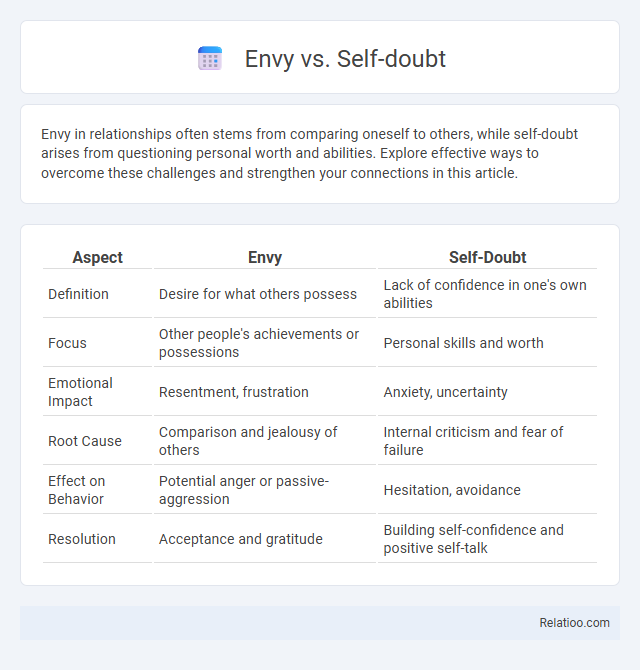Envy in relationships often stems from comparing oneself to others, while self-doubt arises from questioning personal worth and abilities. Explore effective ways to overcome these challenges and strengthen your connections in this article.
Table of Comparison
| Aspect | Envy | Self-Doubt |
|---|---|---|
| Definition | Desire for what others possess | Lack of confidence in one's own abilities |
| Focus | Other people's achievements or possessions | Personal skills and worth |
| Emotional Impact | Resentment, frustration | Anxiety, uncertainty |
| Root Cause | Comparison and jealousy of others | Internal criticism and fear of failure |
| Effect on Behavior | Potential anger or passive-aggression | Hesitation, avoidance |
| Resolution | Acceptance and gratitude | Building self-confidence and positive self-talk |
Understanding Envy and Self-Doubt: Core Definitions
Envy is the feeling of discontent or longing aroused by someone else's possessions, qualities, or achievements, while self-doubt involves a lack of confidence or uncertainty about one's abilities and worth. Understanding the core definitions of envy and self-doubt helps you recognize how envy targets external comparisons, whereas self-doubt reflects internal struggles. Clarifying these distinctions allows for more effective strategies to manage emotions and build self-esteem.
Psychological Roots of Envy and Self-Doubt
Envy and self-doubt both stem from deep psychological roots related to self-esteem and personal identity. Envy arises when you perceive others as having qualities or possessions you lack, triggering feelings of inferiority and desire for what they possess. Self-doubt originates from internalized criticism and fear of failure, causing a persistent lack of confidence in your abilities and decisions.
How Envy Differs from Self-Doubt
Envy is an outward-focused emotion where you compare yourself to others, feeling resentment or longing for what they have, while self-doubt is an inward-focused feeling of uncertainty about your own abilities or worth. Unlike self-doubt, which centers on your personal competence and decisions, envy reflects a desire for external attributes or achievements that belong to someone else. Understanding how envy differs from self-doubt helps you address these emotions more effectively by targeting the root causes--external comparison versus internal insecurity.
Signs You’re Experiencing Envy vs. Self-Doubt
Envy often manifests as persistent comparisons where you feel resentment towards others' success or possessions, accompanied by a desire to obtain what they have. Self-doubt presents through feelings of inadequacy and fear of failure, causing you to question your abilities and decisions without external comparisons. Recognizing these signs helps differentiate envy's outward focus on others from self-doubt's inward focus on your own worth and potential.
Impact of Envy on Personal Growth
Envy can significantly hinder personal growth by fostering negative emotions that distract from self-improvement and goal achievement. Unlike self-doubt, which may prompt introspection and motivate overcoming challenges, envy often leads to resentment and reduced motivation, impairing emotional well-being and productivity. Understanding and managing envy is crucial for maintaining a positive mindset and fostering resilience essential for long-term personal development.
Effects of Self-Doubt on Mental Health
Self-doubt significantly impacts mental health by increasing anxiety, lowering self-esteem, and fostering feelings of inadequacy. This persistent uncertainty can lead to chronic stress, depression, and impaired decision-making abilities. Distinguishing self-doubt from envy is crucial, as envy involves resentment towards others, whereas self-doubt centers on internal negative self-assessment, directly affecting emotional well-being.
Social Triggers: What Fuels Envy and Self-Doubt?
Envy is often fueled by social triggers such as comparisons to others' achievements, possessions, or social status, highlighting perceived personal shortcomings. Self-doubt arises from internalized negative feedback and social rejection, amplifying feelings of inadequacy and fear of failure. Both emotions are intensified in social media environments where curated portrayals of success and happiness create unrealistic benchmarks for self-evaluation.
Transforming Envy into Motivation
Transforming envy into motivation requires recognizing it as a signal of your desires rather than a reflection of your inadequacies. By shifting focus from self-doubt to actionable goals inspired by others' successes, you empower yourself to improve and grow. Harnessing envy constructively fosters resilience and propels your personal development beyond limiting beliefs.
Overcoming Self-Doubt: Practical Strategies
Overcoming self-doubt requires actionable strategies such as reframing negative thoughts, setting achievable goals, and seeking support from trusted mentors or peers. Envy often stems from comparing yourself to others, which deepens self-doubt, but focusing on your unique strengths can diminish its impact. You can build confidence by practicing self-compassion and celebrating small successes, transforming doubt into motivation for growth.
Cultivating Self-Compassion to Combat Both
Envy and self-doubt both stem from feelings of inadequacy but differ in focus--envy centers on others' successes, while self-doubt concentrates on personal abilities. Cultivating self-compassion helps you build resilience by acknowledging your struggles without harsh judgment, fostering a mindset that encourages growth and acceptance. Practicing mindful self-compassion techniques reduces the impact of negative emotions, enhancing emotional well-being and empowering you to overcome both envy and self-doubt effectively.

Infographic: Envy vs Self-doubt
 relatioo.com
relatioo.com